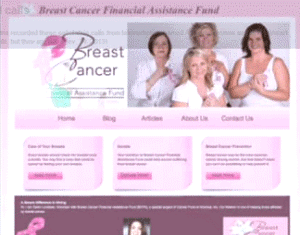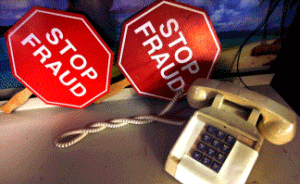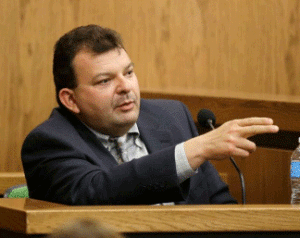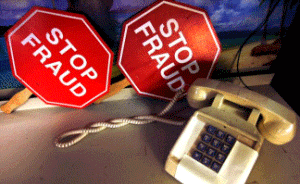Re: America's Worst Charities, by Kris Hundley and Kendall T
PART 5
These telemarketers never stray from the script
by Kris Hundley, Times Staff Writer
NOTICE: THIS WORK MAY BE PROTECTED BY COPYRIGHT
Thursday, November 14, 2013 10:30am
http://www.tampabay.com/news/these-telemarketers-never-stray-from-the-script/2152303

Amanda Thomas is the perfect telemarketer. She's always perky and pleasant. She races through her pitch without a stumble or pause. She never deviates from the script.
"We know it's a bad time right now with the economy and all," she told a South Carolina resident during a call recorded last year. "But the folks we're helping are fighting cancer and they're in need and they're struggling."
Over the past several years, Amanda has called millions of people and helped generate millions of dollars in donations, never once asking for so much as a bathroom break.
"Amanda Thomas" and "Jeff Stewart," her male counterpart, are the latest advancement in charity telemarketing.
But they aren't real people.
They are computer-generated pitchmen designed to seem lifelike on the phone without the messiness of actual humans talking.
Call center workers no longer have to say a word. Instead, they monitor up to three calls at once and tap on separate computer keyboards to choose a pre-recorded response.
When in doubt, employees orchestrating the calls can fill in with phrases that punctuate casual conversation: "yeah," "un-huh" and "no worries."
Many people never realize they are talking to a computer. In the past year, 20 consumers complained to the FTC about "Amanda" from Associated Community Services. Only one guessed she was a recording.
But occasionally someone gets wise.
A South Carolina man recorded a call from Amanda last year and shared it with that state's charity regulators.
Skeptical of who he was talking to, the man asked Amanda to spell "cat."
Her response: "Anything off my script, I'm supposed to get my manager to answer, so hold on just a second, OK?"
Corporations for Character, a telemarketing firm in Murray, Utah, started developing the software now known as the "Echo System" in 2005. Chief executive Forrest S. Baker III said he was looking for a way to increase efficiency because so little money raised by telemarketers actually goes to charity.
Today, the technology is used by Baker's firm and has been licensed by a third party to at least two other telemarketing companies. Among them is Associated Community Services, one of the nation's largest telemarketers, which calls on behalf of about two dozen charities.
When the Echo system was first introduced at the company in 2011, workers monitored two calls at a time. Today, thanks to a recent expansion, they monitor up to three, employees say.
Mike Bills is chief executive of CallAssistant LLC, whose company licenses the Echo system. He said the software ensures that callers make all required disclosures, thereby avoiding regulatory problems. But this month, Corporations for Character paid a $2,000 fine after "Amanda Thomas" failed to identify herself as a paid solicitor on a call taped by regulators.
In a letter to the South Carolina secretary of state, an attorney for the telemarketer blamed their employee for the mistake. They wrote that they had provided "immediate and additional training for the employee that made the call."
Critics of the Echo system point out that it primarily benefits telemarketers, who double or triple the number of calls handled by a single employee.
And with telemarketers keeping as much as 95 percent of money raised, they stand to benefit the most from increased donations.
The agreement between Corporations for Character and Cancer Fund of America shows how lucrative the arrangement can be.
The Knoxville charity agreed to pay Baker's telemarketing firm 95 percent of all initial donations using the Echo system, then 80 percent of all subsequent donations by the same person.
In 2012, Cancer Fund netted about $40,000 of more than $414,000 raised using the software. The rest went to Baker's company, according to reports filed with North Carolina regulators.
Regulators are also concerned that the Echo system is deliberately designed to trick people into thinking they're talking to a live person.
When a curious caller in South Carolina asked if she was talking to a recording, the telemarketer hit a button that responded with a laugh and the phrase, "Do I sound that bad?"
"You are actually talking to a live person," the recording continued, "but I'm using a computer for quality-control purposes."
CallAssistant's chief executive defends the subterfuge.
"The answer is being played by a live agent," Bills said. "There's absolutely someone at the other end of the line."
But the deception was too much for one South Carolina woman, who was disgusted when Amanda kept insisting she was a real person.
"I'm ending this ridiculous call," the woman said before hanging up.
Amanda didn't miss a beat.
"Thank you so much. Bye-bye."
Kris Hundley can be reached at khundley@tampabay.com.

SCOTT KEELER | TimesIowa regulators have used this phone in the state attorney general’s office for years to secretly record telemarketing calls.
These telemarketers never stray from the script 11/14/13 [Last modified: Monday, November 18, 2013 11:43am]
© 2014 Tampa Bay Times
These telemarketers never stray from the script
by Kris Hundley, Times Staff Writer
NOTICE: THIS WORK MAY BE PROTECTED BY COPYRIGHT
YOU ARE REQUIRED TO READ THE COPYRIGHT NOTICE AT THIS LINK BEFORE YOU READ THE FOLLOWING WORK, THAT IS AVAILABLE SOLELY FOR PRIVATE STUDY, SCHOLARSHIP OR RESEARCH PURSUANT TO 17 U.S.C. SECTION 107 AND 108. IN THE EVENT THAT THE LIBRARY DETERMINES THAT UNLAWFUL COPYING OF THIS WORK HAS OCCURRED, THE LIBRARY HAS THE RIGHT TO BLOCK THE I.P. ADDRESS AT WHICH THE UNLAWFUL COPYING APPEARED TO HAVE OCCURRED. THANK YOU FOR RESPECTING THE RIGHTS OF COPYRIGHT OWNERS.
Thursday, November 14, 2013 10:30am
http://www.tampabay.com/news/these-telemarketers-never-stray-from-the-script/2152303

Amanda Thomas is the perfect telemarketer. She's always perky and pleasant. She races through her pitch without a stumble or pause. She never deviates from the script.
"We know it's a bad time right now with the economy and all," she told a South Carolina resident during a call recorded last year. "But the folks we're helping are fighting cancer and they're in need and they're struggling."
Over the past several years, Amanda has called millions of people and helped generate millions of dollars in donations, never once asking for so much as a bathroom break.
"Amanda Thomas" and "Jeff Stewart," her male counterpart, are the latest advancement in charity telemarketing.
But they aren't real people.
They are computer-generated pitchmen designed to seem lifelike on the phone without the messiness of actual humans talking.
Call center workers no longer have to say a word. Instead, they monitor up to three calls at once and tap on separate computer keyboards to choose a pre-recorded response.
When in doubt, employees orchestrating the calls can fill in with phrases that punctuate casual conversation: "yeah," "un-huh" and "no worries."
Many people never realize they are talking to a computer. In the past year, 20 consumers complained to the FTC about "Amanda" from Associated Community Services. Only one guessed she was a recording.
But occasionally someone gets wise.
A South Carolina man recorded a call from Amanda last year and shared it with that state's charity regulators.
Skeptical of who he was talking to, the man asked Amanda to spell "cat."
Her response: "Anything off my script, I'm supposed to get my manager to answer, so hold on just a second, OK?"
Corporations for Character, a telemarketing firm in Murray, Utah, started developing the software now known as the "Echo System" in 2005. Chief executive Forrest S. Baker III said he was looking for a way to increase efficiency because so little money raised by telemarketers actually goes to charity.
Today, the technology is used by Baker's firm and has been licensed by a third party to at least two other telemarketing companies. Among them is Associated Community Services, one of the nation's largest telemarketers, which calls on behalf of about two dozen charities.
When the Echo system was first introduced at the company in 2011, workers monitored two calls at a time. Today, thanks to a recent expansion, they monitor up to three, employees say.
Mike Bills is chief executive of CallAssistant LLC, whose company licenses the Echo system. He said the software ensures that callers make all required disclosures, thereby avoiding regulatory problems. But this month, Corporations for Character paid a $2,000 fine after "Amanda Thomas" failed to identify herself as a paid solicitor on a call taped by regulators.
In a letter to the South Carolina secretary of state, an attorney for the telemarketer blamed their employee for the mistake. They wrote that they had provided "immediate and additional training for the employee that made the call."
Critics of the Echo system point out that it primarily benefits telemarketers, who double or triple the number of calls handled by a single employee.
And with telemarketers keeping as much as 95 percent of money raised, they stand to benefit the most from increased donations.
The agreement between Corporations for Character and Cancer Fund of America shows how lucrative the arrangement can be.
The Knoxville charity agreed to pay Baker's telemarketing firm 95 percent of all initial donations using the Echo system, then 80 percent of all subsequent donations by the same person.
In 2012, Cancer Fund netted about $40,000 of more than $414,000 raised using the software. The rest went to Baker's company, according to reports filed with North Carolina regulators.
Regulators are also concerned that the Echo system is deliberately designed to trick people into thinking they're talking to a live person.
When a curious caller in South Carolina asked if she was talking to a recording, the telemarketer hit a button that responded with a laugh and the phrase, "Do I sound that bad?"
"You are actually talking to a live person," the recording continued, "but I'm using a computer for quality-control purposes."
CallAssistant's chief executive defends the subterfuge.
"The answer is being played by a live agent," Bills said. "There's absolutely someone at the other end of the line."
But the deception was too much for one South Carolina woman, who was disgusted when Amanda kept insisting she was a real person.
"I'm ending this ridiculous call," the woman said before hanging up.
Amanda didn't miss a beat.
"Thank you so much. Bye-bye."
Kris Hundley can be reached at khundley@tampabay.com.

SCOTT KEELER | TimesIowa regulators have used this phone in the state attorney general’s office for years to secretly record telemarketing calls.
These telemarketers never stray from the script 11/14/13 [Last modified: Monday, November 18, 2013 11:43am]
© 2014 Tampa Bay Times

